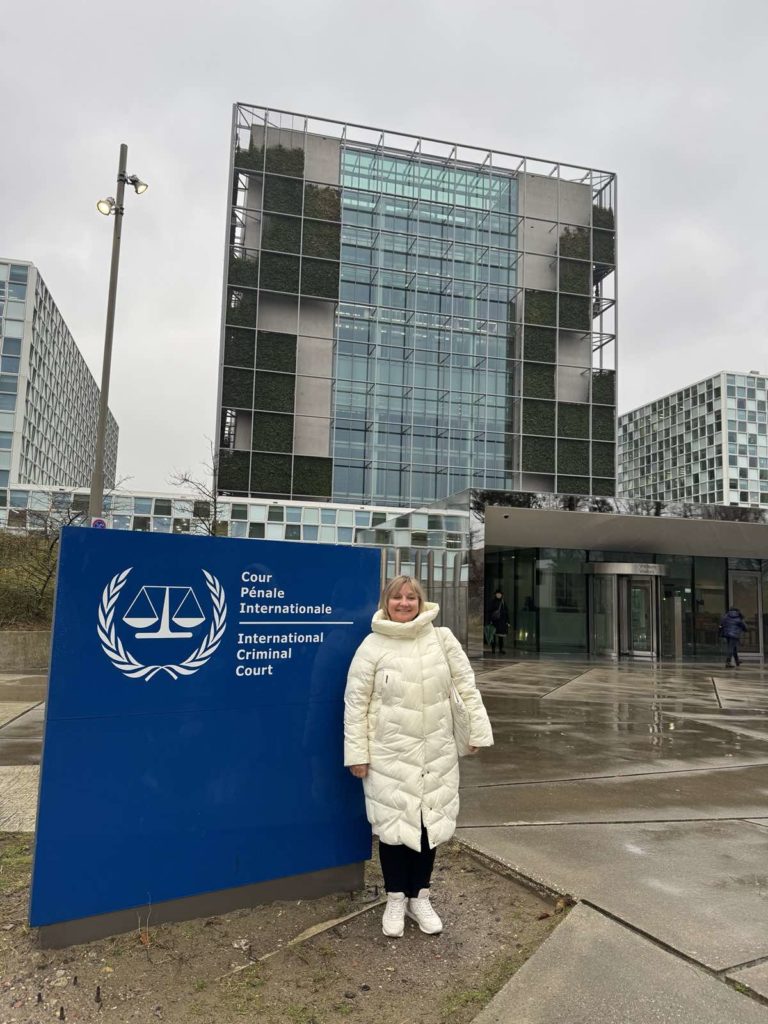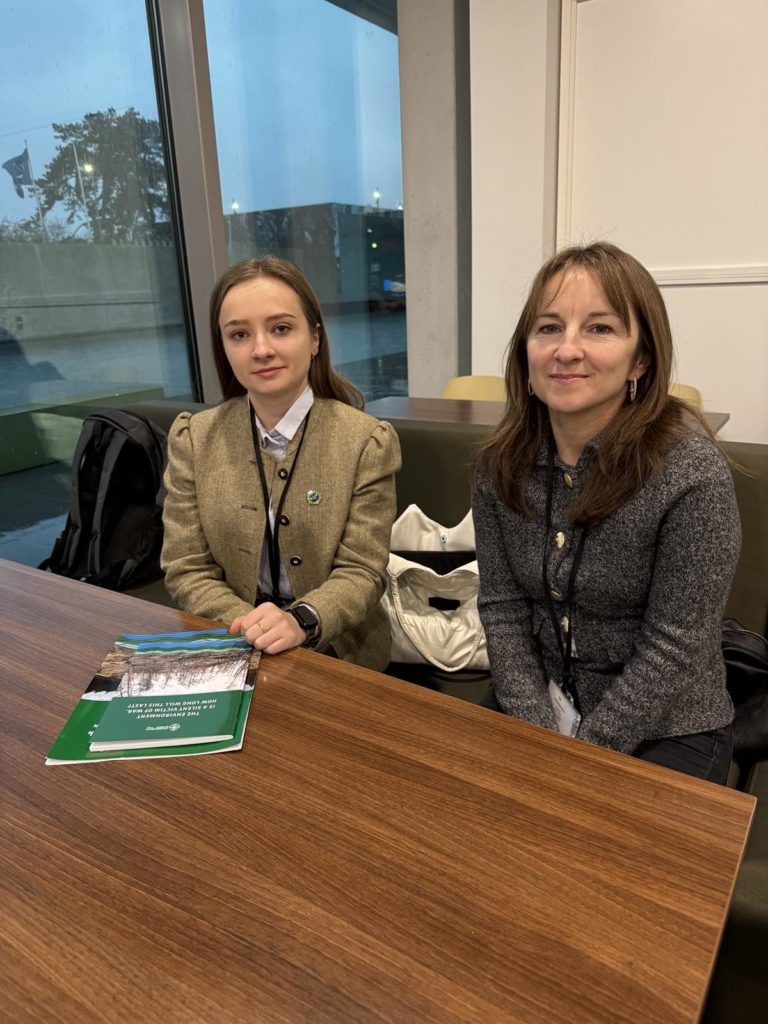In the period of December 2 – 6, representatives of International charitable organization “Environment-People-Law” made an advocacy trip to the global justice center in The Hague (Netherlands), which aimed to increase international attention to the issues of legal definition of ecocide, compensation for damage caused to the Ukrainian environment by Russian aggression, and ensuring environmental justice for Ukraine.
Within the framework of the planned events, EPL representatives held meetings with international experts and lawyers, in particular with representatives of the Institute for Environmental Security. Special attention was paid to the promotion of the idea of recognizing ecocide as an international crime, the challenges and ways of overcoming them in the application of Article 8(2)(b)(iv) of the Rome Statute of the International Criminal Court and development of legal instruments for environmental protection in war conditions within the framework of international legal and political institutions.
Moreover, on December 2, 2024, public hearings on the advisory opinion regarding the obligations of states in the context of climate change began at the UN International Court of Justice in The Hague. These hearings will last until December 13, 2024. Representatives of states, international organizations, and non-governmental organizations were involved in hearings and they presented their positions on issues of responsibility for the climate crisis.The issues raised at the hearings cover legal aspects of the responsibility of states for impact on the climate, defining the obligations of states in the context of combating climate change. This case is an important step towards expanding the legal framework for climate justice at the global level.
The issue of defining ecocide in international law, the criteria of ecocide, application of Article 8 (2)(b)(iv) of the Rome Statute of the International Criminal Court, documenting war-driven damage became central to discussions during the meeting at the office of PAX organization that focuses on peace and justice issues. Representatives of PAX and EPL discussed, among other things: 1) criteria that could form the basis of the legal definition of ecocide, be useful for the application of Article 8(2)(b)(iv) of the Rome Statute of the International Criminal Court in the context of environmental damage; 2) prosecution mechanisms for environmental crimes, particularly in wartime; 3) challenges of collecting the appropriate evidence in cases related to destruction of the environment as a result of the war.
The discussion also touched upon practical challenges in overcoming the problem of military waste and demolition waste, search for innovative approaches to their disposal. In particular, the issues discussed included creating an effective infrastructure for collecting and processing such waste, assessing its impact on the environment and human health, attracting international technical assistance for the introduction of modern environmental technologies, and legal regulation of this area.
Special attention was paid to the discussion of reforming the system of state environmental control in Ukraine. The critical importance of creating an effective, transparent and independent control mechanism capable of prompt detection of violations was emphasized. There were discussed the issues of modernization of the technical base, improvement of the qualifications of inspectors and introduction of digital tools for environmental monitoring.
Thanks to the trip to The Hague, EPL experts were able to join the process of considering the concept of ecocide as a potential fifth crime that can be included in the Rome Statute of the International Criminal Court. It was this topic that became central at the event within the framework of the 23rd Assembly of Member States to the Rome Statute of the ICC “Ecocide as the Fifth International Crime: Introductory Considerations”, organized by the international movement “Stop Ecocide» on December 3, 2024.The participants discussed the following aspects: the importance of creating a clear legal framework for recognizing ecocide as an international crime; the role of states, international organizations and civil society in the formation of new legal norms; strategic steps to achieve a global consensus on combating ecocide.
At a meeting with the executive director of the Chilean organization FIMA, the central issues raised were prospects of adoption and consequences of the advisory opinion of the UN International Court of Justice regarding the obligations of states in the context of climate change and responsibility for their non-fulfillment, international legal aspects of ecocide and war crimes against the environment.
Within the framework of the Assembly of Member States to the Rome Statute, EPL representatives took part in a side-event organized by the Institute for Environmental Security and their partners entitled “Ecocide in conditions of war and peace: the role of the International Criminal Court” dedicated to discussing the possibility of recognizing ecocide as a separate international crime and the role of the ICC in persecution for committing it. EPL representatives emphasized the prospects and difficulties of applying Article 441 of the Criminal Code of Ukraine “Ecocide”, the need for approval and recognition at the official level of scientifically grounded criteria for ecocide, difficulties of gathering evidence and proving in such cases, prospects of recognizing ecocide as the fifth crime under the Rome Statute of the ICC, chances and challenges for application of Article 8(2)(b)(4), the role of civil society in these processes, relationship and importance of positions of the International Court of Justice and the International Criminal Court.
These issues also became central to the meeting with the prosecutor of the International Criminal Court, who emphasized the importance of institutional capacity of both national and international bodies in investigating such crimes, and also emphasized the critical role of the expert community in documenting evidence and initiating prosecution processes. The meeting became a platform for discussing the challenges and prospects of collecting evidence of environmental destruction caused by the Russian invasion of Ukraine, possibilities of cooperation with international partners in this direction. The visit to the International Criminal Court confirmed the importance of consolidating efforts of civil society organizations, state institutions and the international community to achieve justice and bring to justice those guilty of crimes against the environment, in particular in the area of evidence collection.
The meeting with the representatives of the Environment and Transport Inspectorate in the Netherlands revealed the specifics of implementing environmental control in the Netherlands and practical aspects of the inspectorate functioning as an effective control body. This experience is valuable for drawing parallels with the reform of state environmental control in Ukraine.
Documenting environmental crimes in Ukraine is an extremely important topic, and the meeting with the legal adviser of the Register of Damages for Ukraine provided an opportunity to discuss further steps in the development of the Register of Damages for Ukraine, the importance of reflecting environmental damage in this Register, and the possibilities for civil society actors to provide assistance in order to ensure effective functioning of the register.
Therefore, the advocacy trip to the Netherlands included a number of high-level meetings and provided an opportunity to establish direct contacts for the future, to clarify certain aspects of the prospects of submitting cases to the ICC, participating in the development and filling of the International Register of Damage. These meetings once again emphasized the importance of international dialogue and exchange of experience for solving global and regional environmental problems. International partnership for the protection of the environment and human rights must be strengthened and developed because it is a guarantee of progress and successful decisions and actions.




